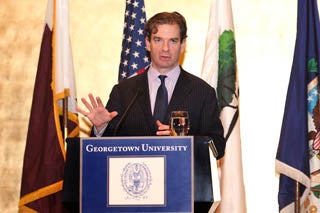Georgetown University in Qatar Hosts Acclaimed International Journalist Peter Bergen

Georgetown University’s Edmund A. Walsh School of Foreign Service in Qatar (SFSQ) held a Faculty Distinguished Lecture hosted by its Center for International and Regional Studies (CIRS) featuring acclaimed journalist, Peter Bergen.
Addressing the capacity-filled house, where the assembly of people ranged from diplomats and faculty-members to students and those with an interest in international affairs, Bergen’s speech, ‘The Awakening: How Revolutionaries, Barack Obama and Ordinary Muslims are Remaking the Middle East’ analyzed significant regional developments in global current affairs.
The CNN national security analyst and recent author of “The Longest War: The Enduring Conflict Between America and Al Qaeda,” based his insightful lecture on the premises of the five interlinked topics of Al Qaeda, terrorism, Af-Pak, the Arab Spring and the influence of President Obama on some of these issues, before engaging the audience in his analyses and predictions for the road ahead.
“The death of Bin Laden was a punctuation point for Al Qaeda… whose strategic goals have failed in getting the US out of the Middle East as a result of waging war against America,” noted Bergen.
“Bin Laden never commented on the Arab Spring. Because what was he going to say? People who led the revolution (in the Arab World) were influenced by Gandhi and non-violent ideas,” added Bergen as he gave the Arab Spring the status of most significant event since the collapse of Ottoman Empire in the 20th Century.
And while monarchies in the Arab World will be able to transform and weather the storms for a variety of reasons, the biggest losers in all of this, Bergen said, were Israel and Iran.
“Israel can no longer claim it is the only democracy in the Middle East. Another big loser is Iran; they are about to lose their key Syrian ally and their only land link to Hamas and Hezbollah.”
The US too, he said, is not a winner in a sense that newly-formed regional governments reflect their populations, most of whom are not pro-US at all.
Moving to Central and South Asia the distinguished author saw a tinge of hope in Afghanistan, where 70% of Afghans now feel their country is heading in the right direction, and in Pakistan, where civil society movements anticipated an Arab Spring even before the Middle East.But it was President Obama’s approach to foreign policy that Bergen was critical of, as the White House has failed to exert real effort on Palestine-Israel relations in the Middle East.
“Obviously the Cairo Speech was the high-water mark of (President) Obama’s relationship with the Muslim World. He’s not as unpopular as (President) Bush but he’s close. He was the anti-war president… but right now the US is involved in five wars; six until recently including Iraq.”CIRS director, Mehran Kamrava said: “Peter Bergen’s lecture comes at a critical juncture vis-à-vis the US and the Muslim World. Tensions between the US and Iran are rising and the outbreak of hostility is a real possibility. Al Qaeda is on the verge of collapse and there are fundamental consequences for the evolution of religion and violence.”“CIRS remains committed to engage in pressing issues through scholarly discussions. We are therefore only glad that Peter Bergen chose to accept being part of our Faculty Distinguished Lecture,” added Kamrava.